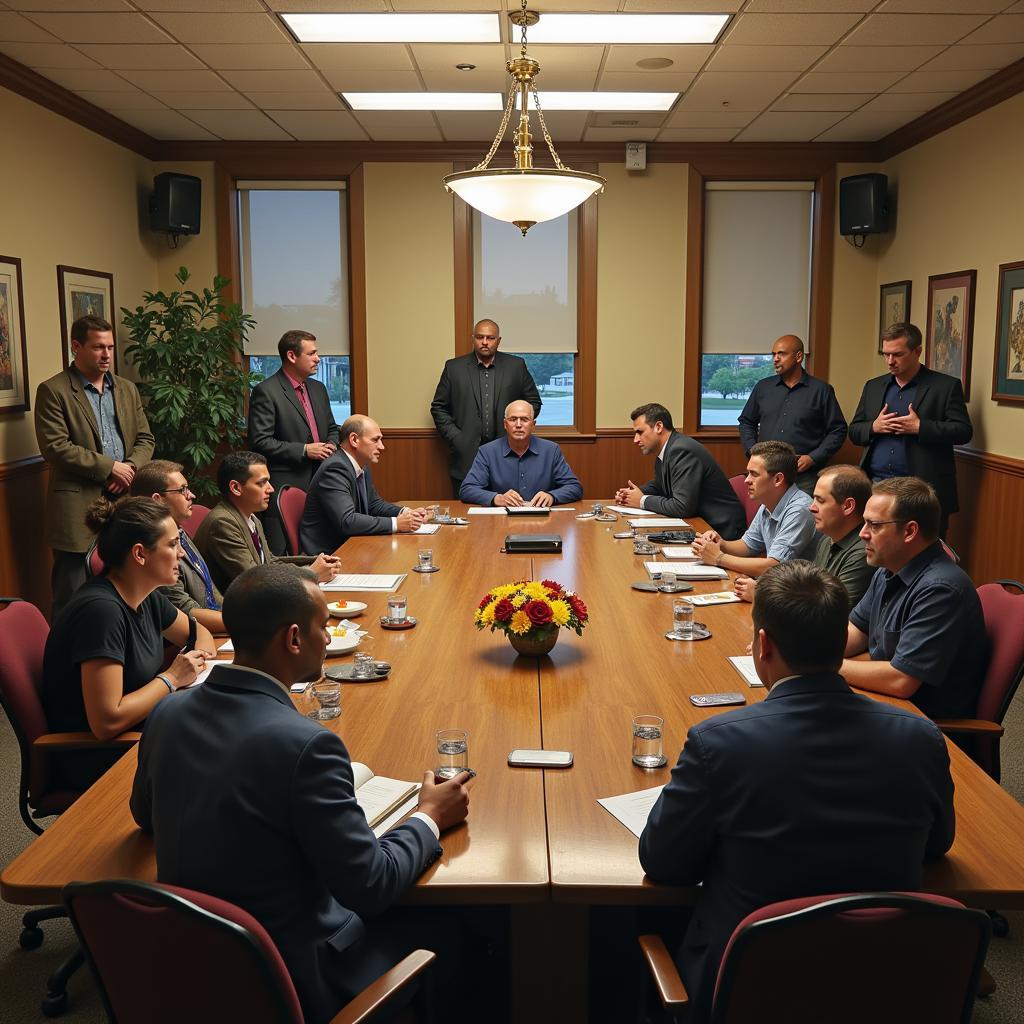An armed society is a polite society. This often-quoted phrase, attributed to Robert Heinlein, encapsulates a complex and controversial relationship between firearm ownership and societal behavior. But does having more guns truly equate to more politeness, or is it a dangerous oversimplification? This article delves into the nuances of this debate, examining the historical context, sociological implications, and real-world consequences of an armed citizenry.
Exploring the “Armed Society, Polite Society” Concept
The idea of an armed polite society suggests that when individuals are armed, they are more likely to be respectful and cautious in their interactions, aware that any aggression could be met with lethal force. Proponents argue that this creates a deterrent effect, minimizing violence and promoting civility. However, critics counter that readily available firearms can escalate conflicts, leading to more violence rather than less.
Does Firearm Ownership Deter Crime?
This is a central question in the debate. While some research suggests a correlation between higher gun ownership and lower crime rates, other studies indicate the opposite. The complexity lies in untangling the causal relationships and accounting for other contributing factors, such as socioeconomic conditions, policing strategies, and cultural norms. The impact of gun ownership on crime rates remains a subject of ongoing and often heated debate.
The Role of Fear in a Heavily Armed Society
Some argue that an armed society fosters a climate of fear, where individuals are constantly on edge, anticipating potential threats. This constant vigilance can erode trust and community cohesion, leading to a more fragmented and paranoid society. Others contend that this heightened awareness encourages responsibility and self-reliance, leading individuals to take greater precautions for their own safety.
 Impact of Armed Society on Community
Impact of Armed Society on Community
The Historical Context of “An Armed Society is a Polite Society”
The phrase often attributed to Robert Heinlein originates in his science fiction novel Beyond This Horizon. It’s important to understand that the context of this quote is a fictional futuristic society, not necessarily a reflection of present-day reality. Analyzing the phrase purely in its historical context offers a limited perspective on its application to modern society.
The Evolution of Firearm Technology and Accessibility
The prevalence and lethality of firearms have changed significantly since Heinlein’s time. The easy availability of high-powered weapons raises new concerns about the potential for escalated violence in an armed society. This evolution of technology necessitates a reevaluation of the “armed society, polite society” concept in light of contemporary realities.
The Social and Psychological Impacts of an Armed Society
Beyond the statistics on crime and violence, there are profound social and psychological implications to consider. How does widespread gun ownership affect our interactions with each other, our sense of community, and our overall well-being?
The Normalization of Violence
Critics argue that the constant presence of firearms normalizes violence, making it seem like an acceptable solution to conflict. This desensitization can have far-reaching consequences, impacting everything from interpersonal relationships to political discourse.
 Effect of Armed Society on Conflict Resolution
Effect of Armed Society on Conflict Resolution
The Burden of Self-Defense
In an armed society, individuals may feel a constant pressure to be prepared to defend themselves. This burden can be emotionally and psychologically taxing, particularly for those who are already vulnerable or marginalized. Dr. Sarah Chen, a sociologist specializing in gun violence, notes, “The perceived need for constant self-defense creates a hyper-vigilant state, leading to increased stress and anxiety.”
The Impact on Trust and Social Cohesion
Professor David Miller, a political scientist, argues, “An armed society can erode trust, making it difficult to build strong communities. When everyone is perceived as a potential threat, social bonds weaken.” This breakdown of trust can further exacerbate existing social divisions.
 Influence of Armed Society on Social Trust
Influence of Armed Society on Social Trust
Conclusion
The relationship between an armed society and a polite society is multifaceted and complex. While the presence of firearms may deter some crime, it also raises serious concerns about escalated violence, social fragmentation, and psychological well-being. Understanding the nuances of this issue requires a thorough examination of the historical, sociological, and psychological factors at play. Building a truly polite society demands a commitment to fostering empathy, understanding, and peaceful conflict resolution, rather than relying solely on the deterrent effect of firearms. The question remains: can we achieve a truly polite society, one built not on fear, but on mutual respect and trust?
FAQ
-
Does the “armed society, polite society” argument apply to all types of firearms? The availability of different types of weapons can have varying impacts on societal behavior.
-
How does gun control legislation affect the “armed society, polite society” dynamic? Gun control measures can influence the accessibility of firearms and potentially alter the dynamics of this relationship.
-
Are there cultural differences in how the “armed society, polite society” concept is perceived? Different cultures have varying perspectives on gun ownership and its impact on social interactions.
-
What role does mental health play in the context of an armed society? Access to mental healthcare and addressing mental health concerns are crucial factors in mitigating potential risks.
-
How can we foster a more polite society without relying solely on firearms? Promoting empathy, communication, and peaceful conflict resolution are essential for building a genuinely polite and respectful society.
Suggested further reading:
- See our related article on armed polite society.
Need further assistance? Contact us 24/7:
Phone: 02043854663
Email: [email protected]
Address: Khu 34, Bac Giang, 260000, Vietnam.